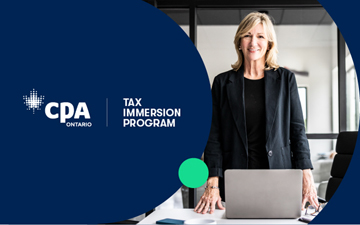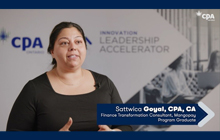2024 Tax Planning: Opportunities & Strategies with the Tax Immersion Program

CPA Ontario's inaugural Tax Immersion Program equips Chartered Professional Accountants with the skills needed to thrive in the evolving tax landscape
THE 2024 tax year has ushered in several significant changes, including an increased capital gains inclusion rate and the introduction of new incentives. But you might be wondering as a Chartered Professional Accountant or tax expert, ‘how do I make the most of these updates for my clients/organization?’
To help with that, we at CPA Ontario have created the new Tax Immersion Program. Led by Alex Garber and Haroon Khan, the Tax Immersion Program brings decades of experience in the field to CPAs. Alex Garber, CPA, CA, MTax, is an award-winning professor at the Schulich School of Business at York University and an independent tax advisor. Haroon Khan, CPA, CA, boasts over 14 years of experience with leading accounting firms — including the Big 4 — as Senior Tax Manager and Tax Partner.
Their combined expertise will give you a well-rounded perspective on the latest tax developments. To give you a glimpse into what you will learn as part of the program we asked them to share some of their thoughts on the 2024 tax updates.
 |
Haroon Khan, CPA, CA, boasts over 14 years of experience with leading accounting firms — including the Big 4 — as Senior Tax Manager and Tax Partner. |
Q: What do you think of the increase in the income inclusion rate for capital gains?
Haroon Khan: To begin, we need to understand what this change means. The federal government announced an increase in the income inclusion rate for individuals on capital gains from 50 percent to two-thirds (66.667%) on gains over $250,000.
This change means that on a capital gain of $350,000, the first $250,000 will remain subject to the 50 percent inclusion rate. However, on the remaining $100,000, the taxable amount will rise from $50,000 to $66,670, potentially leading to higher taxes for individuals.
I think at first glance, these changes may cause individuals to believe that they would have to face increased tax liabilities, especially alongside the new, strengthened General Anti-Avoidance Rule (GAAR). But the government did also introduce other incentives and I think with proper tax planning you can possibly reduce your tax liabilities.
 |
Alex Garber, CPA, CA, MTax, is an award-winning professor at the Schulich School of Business at York University and an independent tax advisor. |
Q: What are some of the incentives that could help tax planning in 2024?
Alex Garber: Like Haroon mentioned a concern for some may be the increased capital gain inclusion rates. However, the government has announced other changes that can help with tax planning. For instance:
The government introduced the Canadian Entrepreneurs' Incentive (CEI). It’s designed to support entrepreneurs in Canada. It provides a reduced capital gains inclusion rate of 33.3 per cent up to a lifetime maximum of $2 million for qualifying businesses when shareholders sell their shares. This incentive is part of a comprehensive strategy to promote growth in the entrepreneurial ecosystem.
Next the Lifetime Capital Gains Exemption (LCGE) has now risen to $1.25 million. This means that when you dispose of shares in a qualified small business corporation or qualified farming or fishing property, you can earn up to this amount in profit without paying taxes on it.
Finally, in 2023 the federal budget introduced Employee Ownership Trusts (EOTs), allowing business owners to sell their company in whole or in part to their employees without requiring them to use their personal funds for the acquisition. If they choose this option, they can earn up to $10 million in profit from the sale without paying any taxes on that profit, as long as they meet specific requirements as outlined in the 2024 Federal budget. I think this is a significant advantage for business owners who want to sell their business while benefiting their employees.
I believe that in order to effectively use these incentives, strategic tax planning is required. For instance, one may have to plan transactions ahead of time to mitigate high inclusion rates and benefit from these new incentives. In my view, by successfully implementing these incentives one can make the most of these tax developments.
CPA Ontario Tax Immersion Program
To help navigate these complex changes, CPA Ontario has launched the new Tax Immersion Program.
Led by instructors with decades of experience, this comprehensive program will equip CPAs with the knowledge and tools to thrive in the 2024 tax environment.
What You’ll Learn
The program goes beyond federal updates and you'll also gain valuable insights into relevant nuances for Ontario tax. This holistic approach ensures you're prepared to handle your clients' or organization’s tax needs.
In this 12-week program, you’ll enhance your tax knowledge and apply your learning within three months. You'll be well-equipped to address and strategically leverage these tax updates as well as provide exceptional tax advice.
Get ready for the 2024 tax season: Register today.
Partner Post sponsored content and images courtesy: CPA Ontario.








(0) Comments